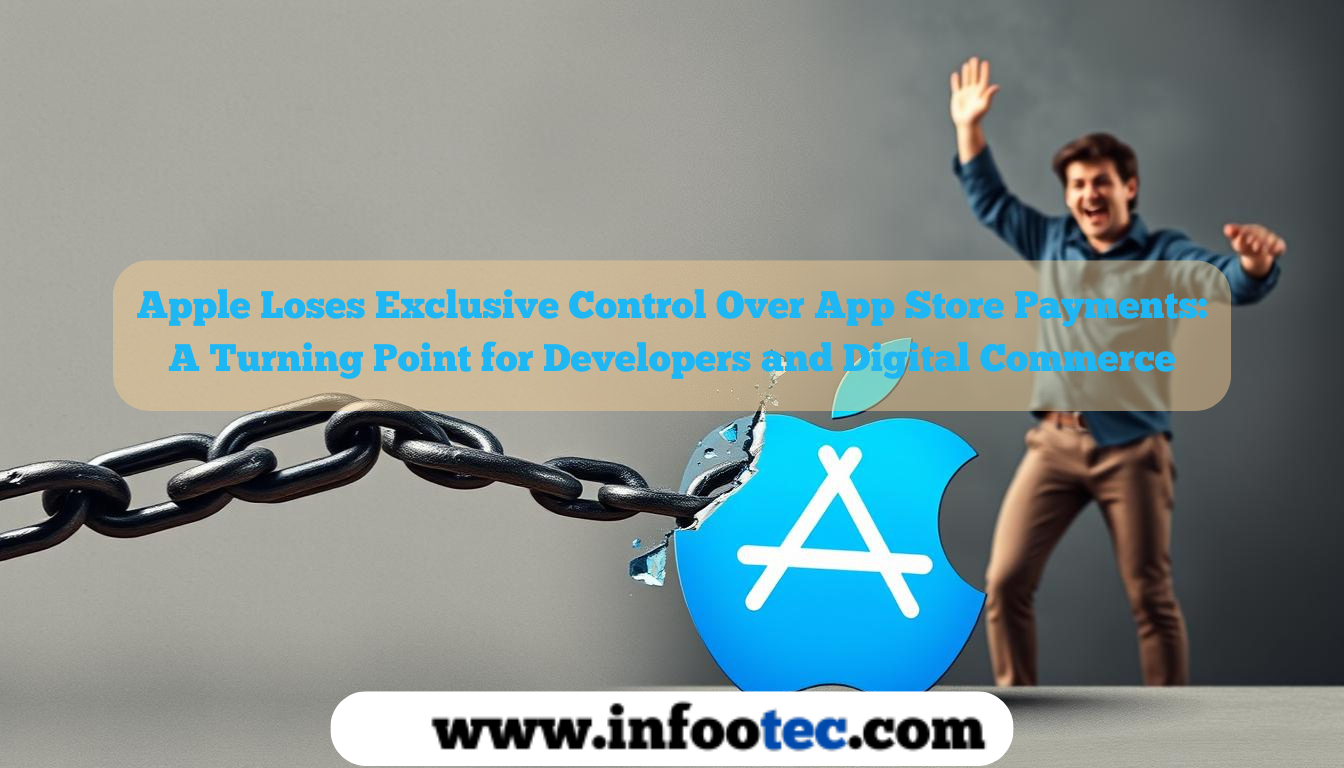Apple Loses Exclusive Control Over App Store Payments: A Turning Point for Developers and Digital Commerce

A U.S. court ruling limits Apple’s control over App Store purchases, enabling developers to bypass in-app payment commissions. Discover what this means for Apple, developers, and the future of mobile ecosystems.
Apple, one of the most influential tech companies in the world, has just suffered a major legal setback. A U.S. federal judge has ruled that Apple can no longer enforce its long-standing policy of taking a 15-30% commission on purchases made outside the App Store. This decision significantly disrupts Apple’s traditional revenue model and has far-reaching implications for developers, consumers, and the broader digital economy.
This case, initially sparked by Epic Games and its popular game Fortnite, escalated into a legal battle questioning whether Apple’s App Store policies constituted monopolistic behavior. The court’s latest ruling suggests a new era in app monetization is underway.
The Background: How It All Started
In August 2020, Epic Games triggered a wave of legal scrutiny when it intentionally bypassed Apple’s payment system within Fortnite, offering players an alternative way to pay. Apple responded by removing Fortnite from the App Store, and Epic Games immediately filed a lawsuit accusing Apple of anti-competitive practices.
This case set off a chain reaction across the tech industry, as developers, regulators, and lawmakers began to question the fairness of Apple’s “walled garden” ecosystem. While Apple argued that its policies ensured safety, privacy, and a seamless user experience, critics claimed the company was exploiting its market dominance to extract excessive fees from developers.
The Court’s Decision: A Blow to Apple’s Commission Model
The U.S. judge ruled that Apple cannot prevent developers from directing users to alternative payment options outside of the App Store. This is a dramatic shift. For years, Apple required all digital purchases to be processed through its own system, from which it took a hefty cut.
While the court did not label Apple a monopoly outright, it emphasized that the company was engaging in “anti-steering” practices that harmed competition. Developers are now legally allowed to inform users of alternative methods for making payments—a move that could drastically reduce Apple’s App Store revenue.
The court ruling will go into effect unless overturned by a higher court, and Apple is expected to appeal. However, the tech giant must now adapt to a reality where its grip on in-app purchases is weakened.
What This Means for Developers
This ruling is widely seen as a win for app developers. By allowing alternative payment methods, developers can now:
- Retain a greater share of their earnings
- Offer users discounts that were previously unfeasible due to Apple’s cut
- Create more flexible pricing models
Small and mid-sized developers, in particular, stand to benefit the most. They can now compete more fairly with larger companies that had the legal muscle and resources to negotiate special deals with Apple.
Consumer Impact: More Options, Lower Prices?
For consumers, the court’s decision may lead to reduced prices. If developers pass on the savings from avoiding Apple’s fees, users might start seeing cheaper subscriptions, in-game purchases, or premium content. Additionally, consumers could enjoy:
- Greater transparency in pricing
- More choices for how to pay
- Fewer limitations on accessing services
However, there could also be downsides. By moving payments outside Apple’s system, users might encounter more fragmented experiences or security risks, as Apple won’t be directly overseeing those transactions.
Apple’s Response and Future Strategy
Apple has expressed disappointment with the ruling and continues to argue that its App Store policies protect users and ensure quality. The company is likely to explore other ways to safeguard its revenue streams, possibly by:
- Adjusting App Store fees or structures
- Offering incentives for developers who stay within the Apple ecosystem
- Innovating new services that justify its fees
Apple also emphasized that it will continue to prioritize security and privacy, warning that allowing external payments may lead to increased fraud and customer support challenges.
The Broader Implications for the Tech Industry
This ruling does not just affect Apple. It could signal broader regulatory and legal actions against dominant tech platforms. Google, which operates a similar Play Store model for Android, could be next in line for scrutiny. Globally, regulators in the EU, South Korea, and Japan are also challenging app store commission policies.
Additionally, the ruling highlights a growing appetite for digital marketplaces to be more open and competitive. As lawmakers across the globe push for more balanced digital economies, we may soon witness:
- Increased antitrust legislation
- Stricter oversight of digital platforms
- Enhanced consumer protection laws
Conclusion: A Tectonic Shift in Mobile App Commerce
The U.S. court’s decision to limit Apple’s control over App Store payment systems is a monumental moment in the tech industry. It reshapes how developers interact with users and how digital ecosystems operate. For Apple, the road ahead involves rethinking its business model while defending its brand integrity.
For developers and users, this ruling represents empowerment and choice—core principles in any healthy digital marketplace.
As the legal and commercial landscapes continue to evolve, one thing is certain: the days of closed ecosystems and rigid payment rules may be numbered. The age of flexibility, competition, and transparency is arriving.



